BUSINESS REFLECTION
After the Bell: Why the passing of the NHI Bill demonstrates the obliviousness and ignorance of SA’s political class
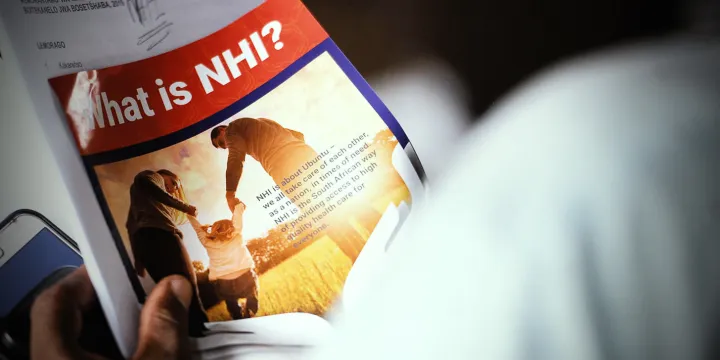
We are who we are. We need more investment in healthcare, not less. And less investment is what the NHI will create because since it excludes the private sector, it will no longer have access to private capital.
What do you do if there is something you want but can’t afford? We all face this problem nearly every day. Personally, my preferred solution is to find an appropriate person or circumstance to blame for this inadequacy, because naturally, the world owes me the desirable object. The fact that I don’t have it means someone or something is at fault. Obvs.
There are other possible solutions. One is to convince myself that I can afford it. You can achieve this by ignoring your bank statement. A version of this “solution” is to claim that although I can’t afford it now, I may well be able to afford it in the future. So, I might as well just go ahead and buy it now because, in time, it won’t break my piggy bank.
There are still other approaches. One is to indignantly claim that because there are people out there suggesting you can’t afford it, they are the ones who are delusional, or even worse, deliberately self-serving and mendacious and determined to prove me wrong. Their private interests impel them to falsely claim that the object of my desires is unaffordable. The fact that they suggest it’s unaffordable is enough (for me) to believe that it is affordable.
The more you think about it, the more ways you can justify your expenses. In my youth, anything my friends had was naturally owed to me, otherwise, the world was being “unfair”. The argument has a high-mindedness which tends to obscure the possible counterargument that I, or my parents, couldn’t afford it.
Oblivious
I know this is all slightly childish, and yet, in respect of the new National Health Insurance Bill (soon-to-be Act), we have heard versions of all of the arguments above. Simply put, the arguments in favour of the NHI system are oblivious to the facts of South Africa today. (I should say the parties in opposition to the NHI system as proposed — not as it happens, national health insurance in principle — are also oblivious in some respects, but I’ll get to that in a moment.)
On Monday, the head of SA’s largest healthcare scheme, Adrian Gore, provided an analysis of the finances required to activate the NHI scheme in SA, explaining for the nth time why a national health insurance scheme as envisaged cannot work in SA now.
He and other healthcare insurance providers, who are all now staring extinction in the face, have made these arguments endlessly to the health department and politicians generally. I’ve heard some of these arguments before, but even so, on the eve of the legislation becoming law, it was interesting to hear an informed voice, familiar with the issues, running through the arguments, yet again.
The basic problem is this: we are who we are. There is no getting around that. South Africa is a medium-income, highly unequal society, in which there has been no real economic growth for more than a decade. Why does that make NHI, as envisaged, unimplementable?
Well, we don’t actually know what the financial basis for the new NHI will be, because the Bill is being passed without clear financial modelling and there is a reason for that: the financial truth is too hard to contemplate. See the unaffordability argument above. But, says Gore, let’s assume that the NHI uses what is currently available. What you get is the following breakdown:
The NHI legislation appears to assume that what it will have available will be in the order of R531-billion in current money. Fine. But this includes an extra R200-billion in new taxes. To get that, VAT will have to go up by 6.5 percentage points, or personal tax will increase by 31% or payroll tax (currently UIF contributions), will have to increase tenfold. I am not making this up.
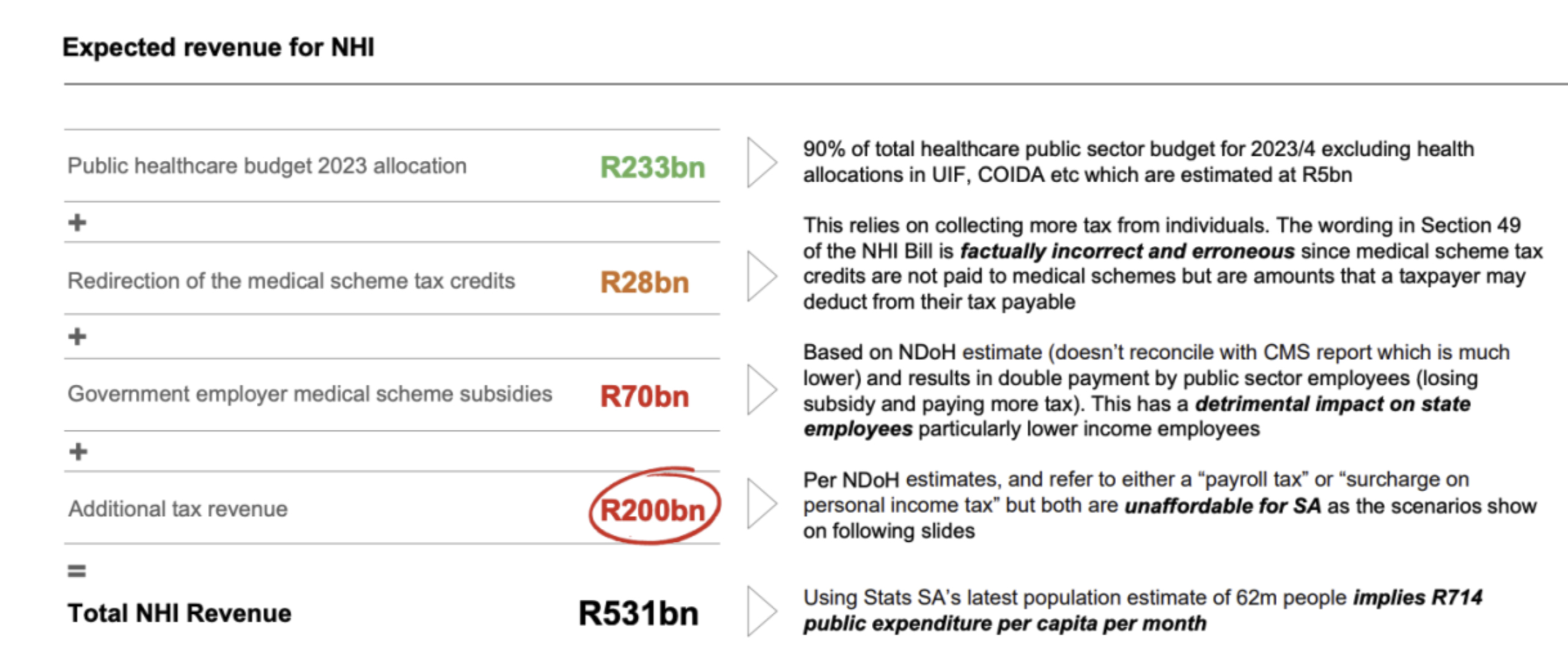
Gore didn’t say this, but allow me to add: The government is working on the assumption that people paying for private healthcare now will be happy to hand over what they currently pay to the government. Trust me, this is not true. But in their minds, that would cover roughly the R200-billion shortfall and means that net-net, these people will be in the same position from an income point of view as they are now; they would just be paying for healthcare to a different entity.
Of course, from a healthcare point of view, they would be getting a lesser service, but it would be the same service everyone gets, so it would be fair.
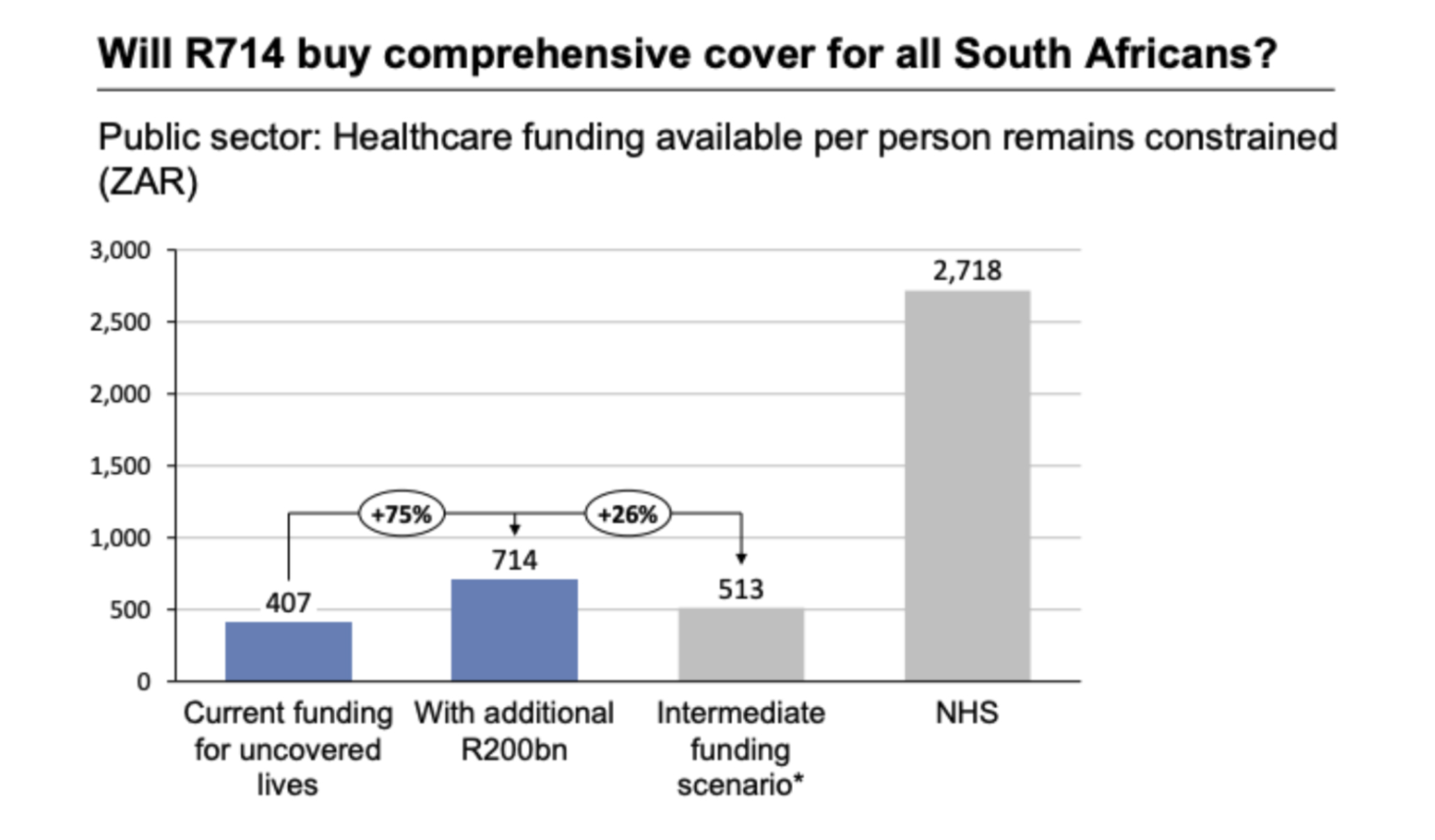
But Gore asks an additional question: what kind of healthcare will this provide South Africans? What we will get is an average expenditure of R714 per person per month. That is substantially less than the Prescribed Minimum Benefits, which healthcare insurance companies are required to cover, of R1,154 pp/pm.
“There is no evidence to show that R714 pp/pm can purchase ‘comprehensive health care services’ contemplated in the NHI Bill,” Gore says. At the current prescribed minimum benefits level, the tax increase would be in the order of R528-billion, or an 82% increase in personal income tax.
What about the lucky people who do have health insurance now? What will they get?
“The medical scheme population will pay 31% more tax and get 69% less healthcare, including a significant portion of pensioners with the highest healthcare needs,” Gore says. That includes public servants, BTW.
There are countries which offer national health insurance without any additional support from the public sector: these are fewer than people think. Almost all countries allow a private sector supplement. Discovery says there are 17 countries that don’t allow any private sector involvement, as opposed to 169 countries that do. Those that can get by without private healthcare are generally rich nations without huge income disparities.
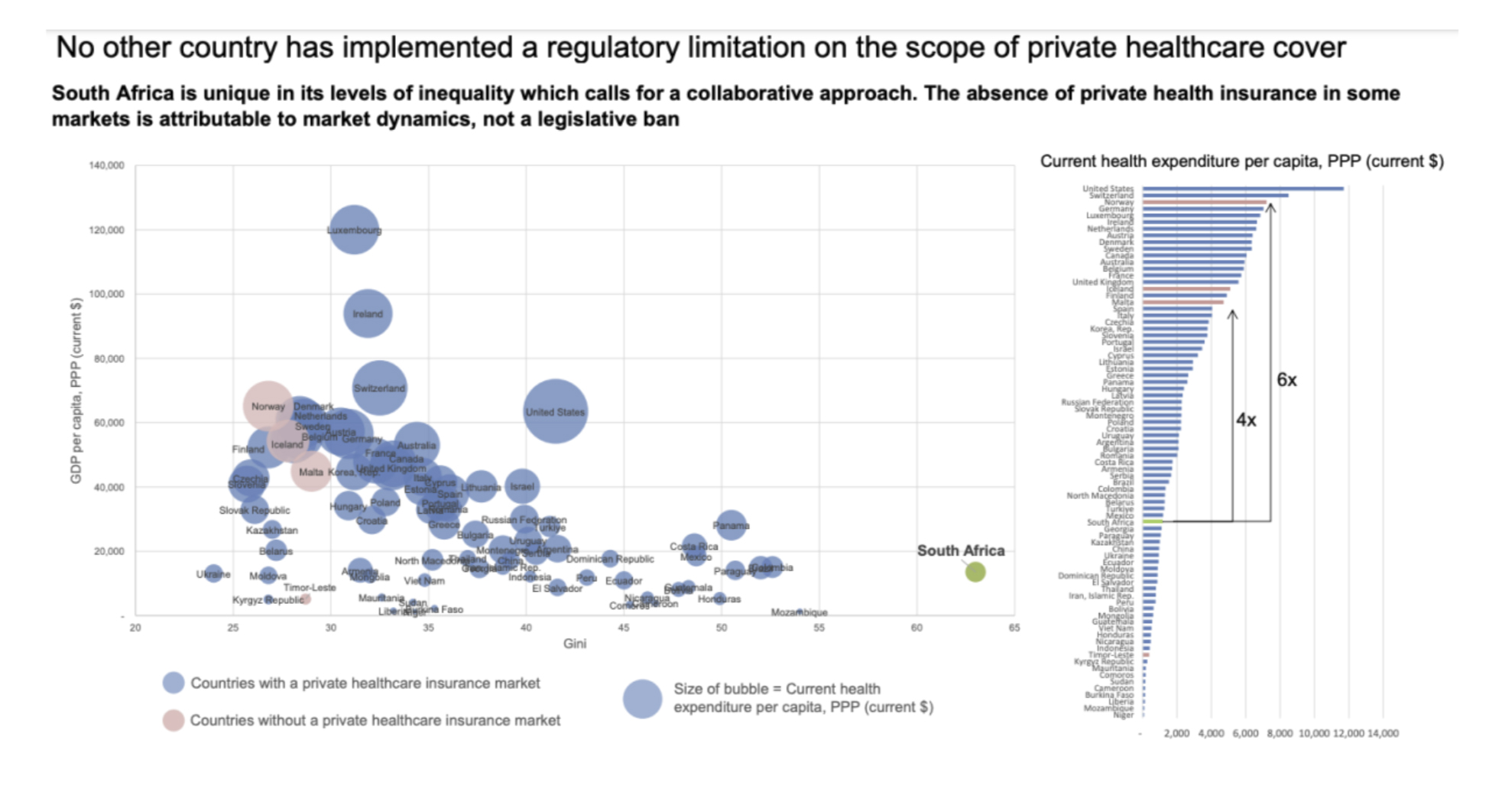
The proponents of NHI have this fanciful notion that everyone will have access to reasonable healthcare facilities. But the numbers suggest that people will be paying much more out-of-pocket. And that’s because if you take SA’s limited resources and stretch it out over the full population, everybody gets very little — if anything at all. This is because, just to take one constraint, there are not enough doctors to service the population as a whole.
We are who we are. We need more investment in healthcare, not less. And less investment is what the NHI will create because since it excludes the private sector, it will no longer have access to private capital.
It is so weird; this is precisely the moment when the government’s solution to its destruction of SA’s electricity provision and transport system is to draft in the public sector. Just when the state has demonstrated — and you can say this without fear of contradiction — its organisational, managerial and financial weaknesses, is the very moment it decides to take over the management of the healthcare system. It’s incredible. I wish I were making this up.
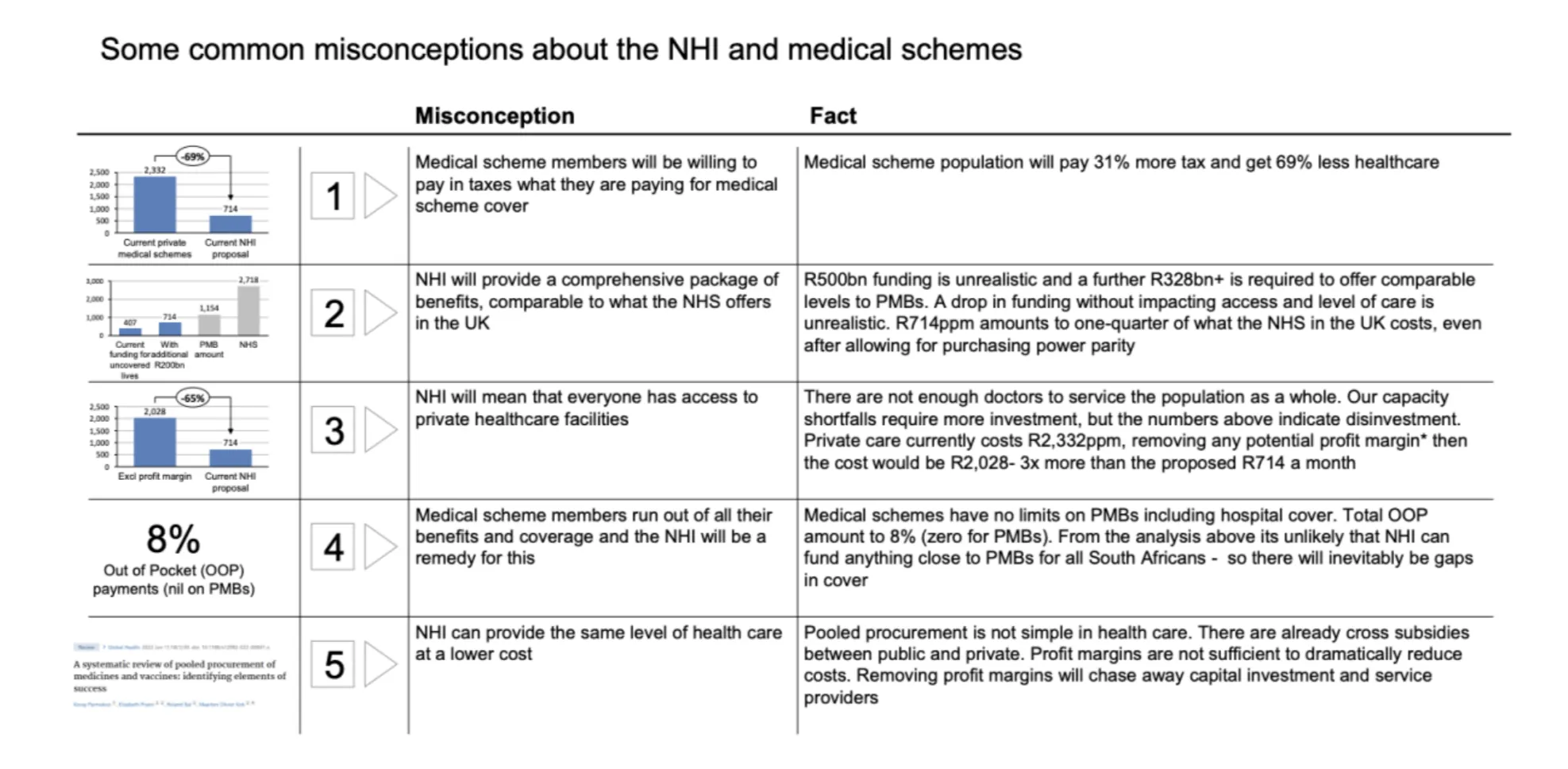
Gore is adamant that he, Discovery, and the private sector are not against NHI in principle. But they too are oblivious in two respects, IMHO. The first is that private sector healthcare has not managed to make its case outside of its bubble. The number of people covered by health insurance is not increasing and when you confront healthcare insurers about this problem, they tend to throw up their hands.
Gore’s response to this charge is that what SA needs is economic growth and more investment in healthcare. He says the industry is open to discussing, in depth with the government, how this should happen.
Gore makes the point that healthcare inflation is higher than general inflation because it’s the way the industry rolls: innovations don’t tend to reduce costs in healthcare, they tend to increase them (research, trials, patents, etc, make this so). I think he is right, but tell that to people with zero healthcare in SA right now. It’s hard.
So what is going to happen? Gore says, realistically, nothing will change for at least a decade. Then there will come a point (we don’t know when), where the health minister will outlaw private health insurance. And then we all throw away our healthcare cards and line up at Baragwanath with our lunch packs and our sheets, and wait for days to see doctors who are overstretched and nurses who are on strike.
Discovery, Profmed, and their ilk will only be able to offer “complementary cover for services not reimbursable by the Fund.” In other words, plastic surgery and stuff like that.
The bigger problem for me is that private healthcare has been trying to push the government on to a different path, which is not actually that different to the one they have chosen, by talking to its leaders.
I have seen industry after industry adopt what they think of as a “constructive approach” — the mining industry, the construction industry, and now the healthcare industry — using this “appeal to the logic of political leaders” notion. And they have all failed.
They have failed because fundamentally SA’s politicians don’t care about affordability, detailed finances or alternatives. What they care about is votes. And if it’s possible to frame a policy solution in a vote-catching way, it’s a done deal, finish and klaar.
The healthcare industry needs to convince not SA’s political leaders, but voters in general, that NHI is not a solution and that there are alternatives — but so far it has not come close. DM

















 Become an Insider
Become an Insider
As always, bang on the button.
The average SAn voter will not listen for very long, if at all, to what any big business might say. This is for three reasons. First, the ANC has trashed SA’s economy but has contrived all manner of excuse and justification to explain this away to an uneducated public as being due to various outside factors, rather than because of the party’s own ineptitudes and outdated policies. Second, most big business in SA is at bottom white-owned which makes it easy for the ANC, the EFF, and their various partners-in-crime with populist ambitions, to poison the well as it were—which they have done quite successfully. Third, the ANC, with substantial help from SADTU, has effectively devastated basic education in SA, which has not only perpetuated but in fact increased widespread functional illiteracy and innumeracy, and in turn this appalling situation ensures that abstract arguments about numbers and affordability and such will fall on mostly deaf ears.
And in these ways, our leaders’ grave inadequacies combine to work in their favour—not by design, but by happy coincidence.
I sincerely then believe, that only said taxpayers should be allowed to vote. It is utter nonsense that people who can only be viewed as parasites in our society have the power to say what should and shouldn’t be done. Criminals should also not be allowed to vote. They gave up that right the day they got convicted. The South African government expect a diminishing number of tax payers to support an ever increasing weight of corruption and illogical idealogies… The average South African is already overburdened by debt and taxes, and is already suffering from poor service delivery. Power cuts, dirty drinking water, poor roads, high inflation, terrible healthcare and education choices like NHI and BELA. All this whilst we have the highest paid, yet most underperforming government officials in the world The officials in charge should also feel our pain. They should not be immune to taxes, power outages etc. The government should always remember that it is only an organizational institute, but we, South Africans have the real power.
“I sincerely then believe, that only said taxpayers should be allowed to vote.”
Interesting point there. However, we are ALL tax payers. We all pay VAT, fuel, airport, municipal tax, etc.
“I sincerely then believe, that only said taxpayers should be allowed to vote.”
Interesting point there. However, we are ALL tax payers. We all pay VAT, fuel, airport, municipal tax, etc.
When the time arrives that (current) medical scheme members are not allowed anymore to belong to their medical scheme and so receive effective medical care, but have to rely on the (new) NHI for receiving ineffective services at current state hospitals etc, expect the middle income and wealthy citizens to emigrate on a large scale. For these people, who can afford it, proper health care services are mandatory (and the NHI will not allow any workarounds such as happened with Solar, Gated Estates etc for other goverment inefficiencies).
There is no going around the fact that private healthcare is very expensive in our country. The painful reality is that the public healthcare system is – extensively – in a deplorable state. Under those circumstances, those who have the resources to access private healthcare that ensures that they can receive top tier services will go for it, regardless of the pain it places on their wallets.
However, as well-intentioned as the notion of the NHI may be, there is no denying that this government does not have the administrative capacity to manage this system, nor the political will to bring on board those who have those abilities. This is just pointing out the lack of skills and qualification. The bigger elephant in the room is their corruption. Anything that has this kind of money in its implementation will drive them insane in looking at the prospect of filling their overflowing guts.
The reality in South Africa is that it will soon implode since there are fools running it who are not competent enough to run a bath, let alone a country. They are not capable of governing themselves, they can not be given the levers of power because it’s akin to giving an infant a gun to play with. The cretins ruling SA are the same as those ruling the rest of Africa, incapable of successful government and totally ignorant of democracy. Can anyone identify a single field of endeavour in SA where management by the majority has been successful ? Is there ANYWHERE they have added value, or have they only destroyed it ! They can lie and cheat and embezzle and play the victim, but the reality is Africa is a cesspit because it is dominated by a recidivist culture which values appearance over substance, which lionises patronage and which lacks a sense of morality appropriate to a technocratic 21st Century. Until Africa abandons this culture, which according to the evidence is not worth much, Africa will remain a field of ashes.
The NHI Bill is a brilliant strategy by the ANC to keep their millions of voters.
I live in a small Karoo town. Those to whom I have spoken, believe that they will lose their social grants if they don’t vote for the ANC.
Now they [those to whom I speak] are telling me that the ANC is going to provide them with better and free medical care.
In the 2019 the ANC received 10 million votes, 57,5% support from the electorate.
Three are now nearly 19 million people surviving on social grants in South Africa.
You do the maths!
The DA and other opposition parties are doing very little to educate the masses at ground level, on the truth. They hold meetings and conferences with other like minded individuals, get lots of nods of approval but they achieve nothing. Preaching to the converted never changed anything!
These masses don’t read the DM nor the comments herein.
They [opposition parties] need to engage with the 19 million and convince them that there is a better way to run a country which will bring in foreign investment which in turn will create more jobs. And dispel the myths that they have been fed all these years.
Well said, and thank you for the graphs.
And thank you for pointing out that South Africa is THE ONLY COUNTRY to Legislate Prohibition of private cover
It is insanity.
The government keeps saying other countries have done their version of NHI. But other countries don’t prohibit private cover.
As you said so succinctly, I wish I was making this up.
Nobody is going to voluntarily contribute R10000 a month to get services at Bara when everyone else is just paying VAT on items for it. And even though the ANC claims private healthcare will still exist it will slowly close down, downgrade levels of care, downgrade services and medications available as they don’t get paid or get paid too little. And eventually all health care will resemble Bara. Which to be fair is actually an academic hospital and health care there is still miles and miles better than non central hospitals, Eg Tembisa, which has made the news a few times for the wrong reasons. Already there is a whole heap of medications and medical items that companies no longer bring into SA because it is not financially viable. Under the NHI as legislated with no private cover, we won’t even have access to the WHO list of essential medicines.